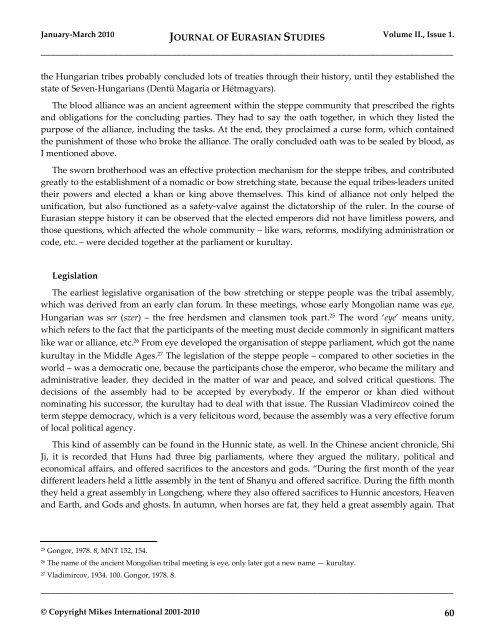EurasianStudies_0110..
EurasianStudies_0110..
EurasianStudies_0110..
Create successful ePaper yourself
Turn your PDF publications into a flip-book with our unique Google optimized e-Paper software.
January-March 2010 JOURNAL OF EURASIAN STUDIES Volume II., Issue 1.<br />
_____________________________________________________________________________________<br />
the Hungarian tribes probably concluded lots of treaties through their history, until they established the<br />
state of Seven-Hungarians (Dentü Magaria or Hétmagyars).<br />
The blood alliance was an ancient agreement within the steppe community that prescribed the rights<br />
and obligations for the concluding parties. They had to say the oath together, in which they listed the<br />
purpose of the alliance, including the tasks. At the end, they proclaimed a curse form, which contained<br />
the punishment of those who broke the alliance. The orally concluded oath was to be sealed by blood, as<br />
I mentioned above.<br />
The sworn brotherhood was an effective protection mechanism for the steppe tribes, and contributed<br />
greatly to the establishment of a nomadic or bow stretching state, because the equal tribes-leaders united<br />
their powers and elected a khan or king above themselves. This kind of alliance not only helped the<br />
unification, but also functioned as a safety-valve against the dictatorship of the ruler. In the course of<br />
Eurasian steppe history it can be observed that the elected emperors did not have limitless powers, and<br />
those questions, which affected the whole community – like wars, reforms, modifying administration or<br />
code, etc. – were decided together at the parliament or kurultay.<br />
Legislation<br />
The earliest legislative organisation of the bow stretching or steppe people was the tribal assembly,<br />
which was derived from an early clan forum. In these meetings, whose early Mongolian name was eye,<br />
Hungarian was ser (szer) – the free herdsmen and clansmen took part. 25 The word ‘eye’ means unity,<br />
which refers to the fact that the participants of the meeting must decide commonly in significant matters<br />
like war or alliance, etc. 26 From eye developed the organisation of steppe parliament, which got the name<br />
kurultay in the Middle Ages. 27 The legislation of the steppe people – compared to other societies in the<br />
world – was a democratic one, because the participants chose the emperor, who became the military and<br />
administrative leader, they decided in the matter of war and peace, and solved critical questions. The<br />
decisions of the assembly had to be accepted by everybody. If the emperor or khan died without<br />
nominating his successor, the kurultay had to deal with that issue. The Russian Vladimircov coined the<br />
term steppe democracy, which is a very felicitous word, because the assembly was a very effective forum<br />
of local political agency.<br />
This kind of assembly can be found in the Hunnic state, as well. In the Chinese ancient chronicle, Shi<br />
Ji, it is recorded that Huns had three big parliaments, where they argued the military, political and<br />
economical affairs, and offered sacrifices to the ancestors and gods. “During the first month of the year<br />
different leaders held a little assembly in the tent of Shanyu and offered sacrifice. During the fifth month<br />
they held a great assembly in Longcheng, where they also offered sacrifices to Hunnic ancestors, Heaven<br />
and Earth, and Gods and ghosts. In autumn, when horses are fat, they held a great assembly again. That<br />
25 Gongor, 1978. 8, MNT 152, 154.<br />
26 The name of the ancient Mongolian tribal meeting is eye, only later got a new name — kurultay.<br />
27 Vladimircov, 1934. 100. Gongor, 1978. 8.<br />
_____________________________________________________________________________________<br />
© Copyright Mikes International 2001-2010 60

















